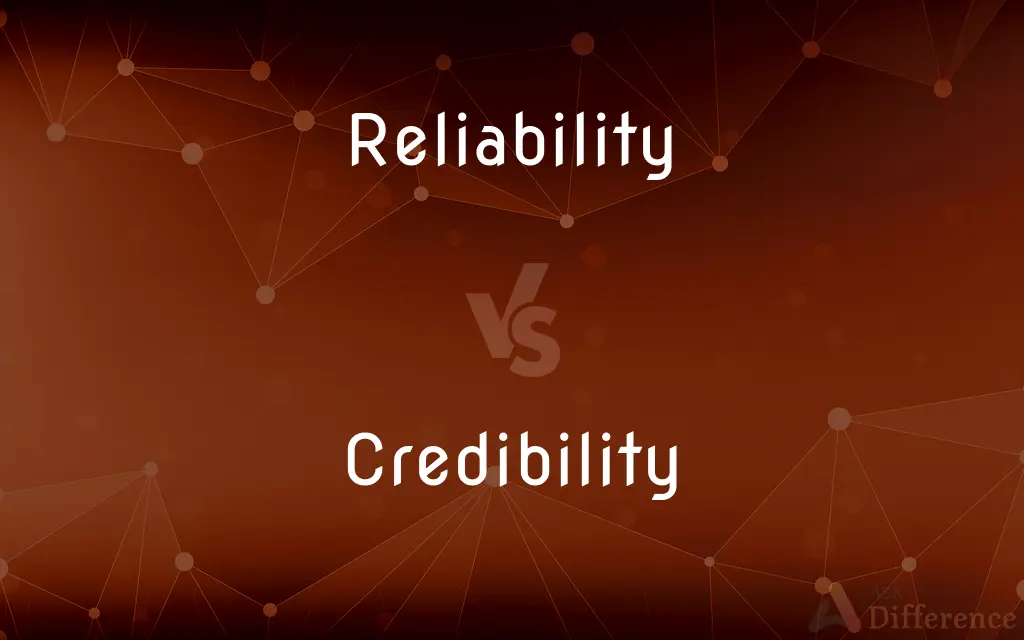Reliability vs. Credibility — What's the Difference?
By Tayyaba Rehman & Fiza Rafique — Updated on March 31, 2024
Reliability refers to consistency in performance or behavior over time, while credibility indicates trustworthiness and believability based on perceived competence or character.

Difference Between Reliability and Credibility
Table of Contents
ADVERTISEMENT
Key Differences
Reliability is about the ability of a person, system, or tool to perform consistently well or deliver outcomes predictably over time. It’s focused on dependability in the context of repeated actions or behaviors. Whereas credibility relates to the degree to which an individual or information is perceived as trustworthy or believable, often based on reputation, expertise, or evidence.
When assessing information sources, reliability might refer to the consistency of the information provided across multiple instances, suggesting a pattern of accuracy. On the other hand, credibility focuses on the source's authority, expertise, and trustworthiness in providing accurate and dependable information.
In the context of machinery or technology, reliability is quantifiable, often measured through tests and statistical analyses to predict performance stability over time. Credibility, however, is less about measurable performance and more about the confidence users or observers have in the technology based on past accuracy, brand reputation, or the perceived expertise of the developers.
Reliability in personal relationships is gauged by the consistency of someone’s actions and their dependability over time. Credibility in the same relationships, however, stems from the individual's honesty, integrity, and the alignment of their actions with their words, influencing how much they are trusted.
In scientific research, reliability refers to the repeatability of results when experiments are conducted under the same conditions, while credibility is concerned with the validity and trustworthiness of the research findings, influenced by the methodology's rigor and the researchers' objectivity.
ADVERTISEMENT
Comparison Chart
Definition
Consistency and dependability in performance or behavior.
Trustworthiness and believability based on competence or character.
Focus Area
Performance consistency over time.
Perceived trustworthiness and authority.
Measured by
Tests, statistical analyses, and historical performance.
Evaluation of expertise, evidence, and reputation.
Context of Use
Machinery, systems, technology, personal actions.
Information sources, personal integrity, scientific research.
Importance in
Technology, engineering, personal reliability.
Journalism, research, personal credibility.
Compare with Definitions
Reliability
Measurable performance stability.
The reliability of this data is supported by extensive testing.
Credibility
Evaluation of authority and expertise.
Her research gained credibility through peer review.
Reliability
Consistency of a product or person over time.
The software's reliability has been proven across multiple updates.
Credibility
Trustworthiness and believability of a source or individual.
The doctor's credibility is enhanced by her years of experience.
Reliability
Stability of results under the same conditions.
The experiment's reliability is confirmed through repeated trials.
Credibility
The quality of being convincing or believable.
The credibility of the theory is still under debate.
Reliability
Dependability in performance or behavior.
Her reliability as a project manager is well-regarded by her team.
Credibility
Dependence on reputation for trust.
The newspaper's credibility is high due to its accurate reporting.
Reliability
The predictability of an outcome.
The car's reliability decreases after 100,000 miles.
Credibility
Perceived integrity and competence.
His arguments lost credibility due to the lack of evidence.
Reliability
Capable of being relied on; dependable
A reliable assistant.
A reliable car.
Credibility
Credibility comprises the objective and subjective components of the believability of a source or message. Credibility dates back to Aristotle theory of Rhetoric.
Reliability
Yielding the same or compatible results in different clinical experiments or statistical trials.
Credibility
The quality of being trusted and believed in
The government's loss of credibility
Reliability
The quality of being reliable, dependable, or trustworthy.
Credibility
The quality, capability, or power to elicit belief
"The scandals posed a crisis of credibility for collegiate athletics" (Taylor Branch).
Reliability
(education) the ability to measure the same thing consistently (of a measurement indicating the degree to which the measure is consistent); that is, repeated measurements would give the same result (See also validity).
Credibility
A capacity for belief
A story that strained our credibility.
Reliability
(engineering) measurable time of work before failure
Credibility
Reputation impacting one's ability to be believed.
After weeks of blowing smoke, her credibility with me was next to nil.
Reliability
The state or quality of being reliable; reliableness.
Credibility
(legal) Believability of statements by a witness, as measured by whether the testimony is probable or improbable when judged by common experience.
Reliability
The trait of being dependable or reliable
Credibility
The quality of being credible; credibleness; as, the credibility of facts; the credibility of witnesses.
Credibility
The quality of being believable or trustworthy
Common Curiosities
What determines the reliability of a system?
The reliability of a system is determined by its consistency in performing its intended function under specified conditions over time.
What impacts the credibility of a researcher?
The credibility of a researcher is impacted by their qualifications, the rigor of their methodology, the transparency of their findings, and their reputation in the field.
What role does evidence play in credibility?
Evidence is fundamental to credibility, as it provides the basis for trustworthiness by supporting claims or assertions with verifiable information.
How can a brand improve its credibility?
A brand can improve its credibility by ensuring the accuracy of its communications, demonstrating expertise, engaging ethically with customers, and consistently delivering quality products or services.
Why is reliability important in technology?
Reliability in technology ensures that devices or software perform consistently, leading to user satisfaction, safety, and trust in the technology.
Can a source be reliable but not credible?
Yes, a source might consistently provide information (reliable) but lack trustworthiness or authority on the subject (not credible).
Is reliability more important than credibility?
Neither is universally more important; the importance varies by context. Reliability is crucial for performance consistency, while credibility is key for trustworthiness and believability.
How is credibility established?
Credibility is established through demonstrated expertise, accuracy in information, ethical conduct, and building a reputation for trustworthiness.
How do personal experiences influence credibility?
Personal experiences can significantly influence credibility, as positive experiences build trust and negative experiences can diminish trustworthiness.
Can reliability change over time?
Yes, reliability can change over time as conditions change or wear and tear affect performance.
What makes an information source credible?
An information source is made credible by its accuracy, authoritativeness, transparency, and the reliability of its content.
Can credibility be measured?
Credibility can be assessed through qualitative evaluations of trustworthiness, expertise, and reputation, though it is more subjective than the quantitative measures used for reliability.
How does consistency relate to reliability and credibility?
Consistency is a key factor in both reliability (consistent performance) and credibility (consistent integrity and trustworthiness).
What affects the reliability of a study?
The reliability of a study is affected by the consistency of its methods, the precision of measurements, and the stability of its results over repeated trials.
Is credibility subjective?
Credibility can be somewhat subjective, as it involves personal judgments about trustworthiness and expertise.
Share Your Discovery

Previous Comparison
Medial vs. Median
Next Comparison
Toxication vs. IntoxicationAuthor Spotlight
Written by
Tayyaba RehmanTayyaba Rehman is a distinguished writer, currently serving as a primary contributor to askdifference.com. As a researcher in semantics and etymology, Tayyaba's passion for the complexity of languages and their distinctions has found a perfect home on the platform. Tayyaba delves into the intricacies of language, distinguishing between commonly confused words and phrases, thereby providing clarity for readers worldwide.
Co-written by
Fiza RafiqueFiza Rafique is a skilled content writer at AskDifference.com, where she meticulously refines and enhances written pieces. Drawing from her vast editorial expertise, Fiza ensures clarity, accuracy, and precision in every article. Passionate about language, she continually seeks to elevate the quality of content for readers worldwide.













































